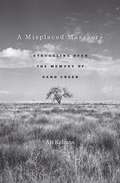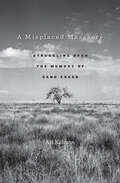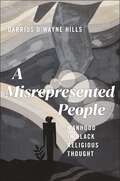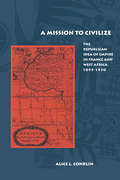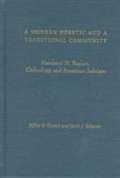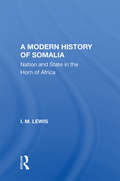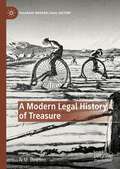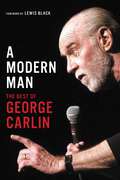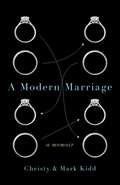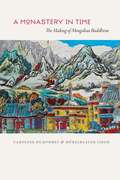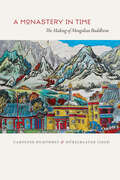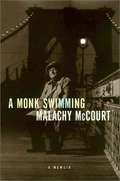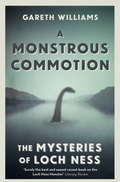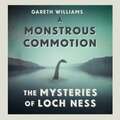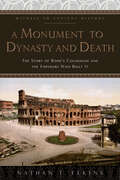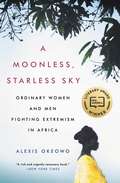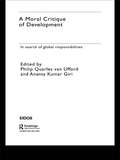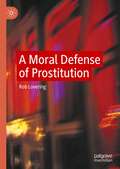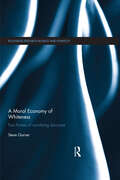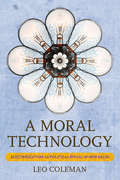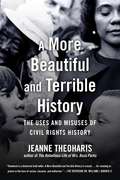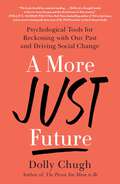- Table View
- List View
A Misplaced Massacre
by Ari KelmanIn the early morning of November 29, 1864, with the fate of the Union still uncertain, part of the First Colorado and nearly all of the Third Colorado volunteer regiments, commanded by Colonel John Chivington, surprised hundreds of Cheyenne and Arapaho people camped on the banks of Sand Creek in southeastern Colorado Territory. More than 150 Native Americans were slaughtered, the vast majority of them women, children, and the elderly, making it one of the most infamous cases of state-sponsored violence in U. S. history. A Misplaced Massacre examines the ways in which generations of Americans have struggled to come to terms with the meaning of both the attack and its aftermath, most publicly at the 2007 opening of the Sand Creek Massacre National Historic Site. This site opened after a long and remarkably contentious planning process. Native Americans, Colorado ranchers, scholars, Park Service employees, and politicians alternately argued and allied with one another around the question of whether the nation’s crimes, as well as its achievements, should be memorialized. Ari Kelman unearths the stories of those who lived through the atrocity, as well as those who grappled with its troubling legacy, to reveal how the intertwined histories of the conquest and colonization of the American West and the U. S. Civil War left enduring national scars. Combining painstaking research with storytelling worthy of a novel, A Misplaced Massacre probes the intersection of history and memory, laying bare the ways differing groups of Americans come to know a shared past.
A Misplaced Massacre: Struggling over the Memory of Sand Creek
by Ari KelmanIn the early morning of November 29, 1864, with the fate of the Union still uncertain, part of the First Colorado and nearly all of the Third Colorado volunteer regiments, commanded by Colonel John Chivington, surprised hundreds of Cheyenne and Arapaho people camped on the banks of Sand Creek in southeastern Colorado Territory. More than 150 Native Americans were slaughtered, the vast majority of them women, children, and the elderly, making it one of the most infamous cases of state-sponsored violence in U.S. history. A Misplaced Massacre examines the ways in which generations of Americans have struggled to come to terms with the meaning of both the attack and its aftermath, most publicly at the 2007 opening of the Sand Creek Massacre National Historic Site.This site opened after a long and remarkably contentious planning process. Native Americans, Colorado ranchers, scholars, Park Service employees, and politicians alternately argued and allied with one another around the question of whether the nation’s crimes, as well as its achievements, should be memorialized. Ari Kelman unearths the stories of those who lived through the atrocity, as well as those who grappled with its troubling legacy, to reveal how the intertwined histories of the conquest and colonization of the American West and the U.S. Civil War left enduring national scars.Combining painstaking research with storytelling worthy of a novel, A Misplaced Massacre probes the intersection of history and memory, laying bare the ways differing groups of Americans come to know a shared past.
A Misrepresented People: Manhood in Black Religious Thought (Religion and Social Transformation)
by Darrius D'wayne HillsOffers a Black male response to the challenge of womanist thoughtAlthough much Black religious scholarship has engaged with feminist theory and womanist thought, a gap remains where little work has been done in religious studies to investigate the Black male experience. A Misrepresented People explores how African American men grapple with identity and masculinity in relation to Black religious thought. This book counters the dominant portrayal of Black men in American society as suspicious, morally defective, and irredeemable, and showcases the strength and relevance of Black religious thought in developing alternative notions of Black manhood.Drawing on womanist discourses, African American religious thought, literature, and Black male studies, as well as an examination of the writings and sermons of Howard Thurman and Martin Luther King Jr., Darrius D’wayne Hills offers a vision of Black male identity that is grounded in interpersonal relationships and connection. Positioning identity formation as a religious concern, Hills expands the application of religious scholarship toward the complex social and material realities faced by Black men. In doing so, this volume offers a much-needed new model for understanding Black male gender identity, illustrating how religious thought fosters more holistic and livable futures for African American men.
A Mission To Civilize
by Alice L. Conklin<P>This book addresses a central but often ignored question in the history of modern France and modern colonialism: How did the Third Republic, highly regarded for its professed democratic values, allow itself to be seduced by the insidious and persistent appeal of a “civilizing” ideology with distinct racist overtones? <P>By focusing on a particular group of colonial officials in a specific setting—the governors general of French West Africa from 1895 to 1930—the author argues that the ideal of a special civilizing mission had a decisive impact on colonial policymaking and on the evolution of modern French republicanism generally.
A Model of Multiple Equilibria in Geographic Labor Mobility
by Antonio Spilimbergo Luis UbedaA report from the International Monetary Fund.
A Modern Heretic and a Traditional Community: Mordecai M. Kaplan, Orthodoxy, and American Judaism
by Jeffrey S. Gurock Jacob J. SchacterEncompasses more than previous autobiographies of Kaplan (1881-1983) by considering at length the community he came from, lived in, fought with, and left behind. Follows him from his early days as a member in good standing in the New York Orthodox Jewish community, through his private estrangement and public divorce from Orthodoxy, to his founding of Reconstructionism and many decades as the movement's leader. Queries whether a religious group can learn anything from one of its members who has rejected its most fundamental beliefs. Annotation c. by Book News, Inc., Portland, Or.
A Modern History Of Somalia: Nation And State In The Horn Of Africa, Revised, Updated, And Expanded Edition
by I.M. LewisThis latest edition of A Modern History of the Somali brings I. M. Lewis's definitive history up to date and shows the amazing continuity of Somali forms of social organization. Lewis's history portrays the ingeniousness with which the Somali way of life has been adapted to all forms of modernity. "By far the most penetrating of the works on Somal
A Modern History of German Criminal Law
by Thomas Vormbaummichael BohlanderIncreasingly, international governmental networks and organisations make it necessary to master the legal principles of other jurisdictions. Since the advent of international criminal tribunals this need has fully reached criminal law. A large part of their work is based on comparative research. The legal systems which contribute most to this systemic discussion are common law and civil law, sometimes called continental law. So far this dialogue appears to have been dominated by the former. While there are many reasons for this, one stands out very clearly: Language. English has become the lingua franca of international legal research. The present book addresses this issue. Thomas Vormbaum is one of the foremost German legal historians and the book's original has become a cornerstone of research into the history of German criminal law beyond doctrinal expositions; it allows a look at the system's genesis, its ideological, political and cultural roots. In the field of comparative research, it is of the utmost importance to have an understanding of the law's provenance, in other words its historical DNA.
A Modern Legal History of Treasure (Palgrave Modern Legal History)
by N.M. DawsonThis book examines treasure law and practice from the rise of the new science of archaeology in the early Victorian period to the present day. Drawing on largely-unexamined state records and other archives, the book covers several legal jurisdictions: England and Wales, Scotland, Ireland pre- and post-independence, and post-partition Northern Ireland. From the Mold gold cape (1833) to the Broighter hoard (1896), from Sutton Hoo (1939) to the Galloway hoard (2014), the law of treasure trove, and the Treasure Act 1996, are considered through the prism of notable archaeological discoveries, and from the perspectives of finders, landowners, archaeologists, museum professionals, collectors, the state, and the public. Literally and metaphorically, treasure law is revealed as a ground-breaking chapter in the history of the legal protection of cultural property and cultural heritage in Britain and Ireland.
A Modern Man: The Best of George Carlin
by George CarlinExperience George Carlin as you&’ve never seen him in this collection highlighting his greatest hits and achievements, including never-before-seen material. It is impossible to talk about 20th century comedy without discussing George Carlin. Named the 2nd greatest standup of the 20th century by both Comedy Central and Rolling Stone, Carlin garnered multiple gold records, 4 Grammys, 6 Emmy nominations, and the Mark Twain Prize for American Humor. He was the first host of SNL, appeared on the Tonight Show some 130 times, and acted in beloved films like Bill and Ted&’s Excellent Adventure and Dogma. Dubbed &“the dean of counterculture comedians,&” George Carlin was an American icon. A perfect introduction for new fans and a worthy addition to the collections of old fans, The Best of Carlin showcases the longevity, range, and—above all—hilarity of the master. Filled with thoughts, musings, questions, lists, beliefs, curiosities, monologues, assertions, assumptions, and other delicious verbal ordeals, it is drop-dead funny tour through Carlin&’s mind. More than ten years after his death, Carlin&’s characteristically ironic takes on life's annoying universal truths remain thoughtful, fearless, and somehow more relevant than ever.
A Modern Marriage
by Christy Kidd Mark KiddIn this candid memoir about a marriage that risked everything to emerge stronger than ever, one couple takes us outside the bounds of monogamy and into one of the most fascinating and secretive subcultures in the nation--swinging.With fifteen million strong worldwide, swingers are everywhere--a huge community, hiding in plain sight, whose erotic pastime has remained a complete mystery to the rest of us. Christy and Mark Kidd certainly had no idea what they were getting into when at one fateful New Year's Eve party they decided to venture behind a mysterious velvet curtain and discovered a whole new world of sexuality they never thought possible. The swinging lifestyle still remains largely taboo in our country. The Kidds were just as skeptical when they returned home. Could they ever take their relationship to that level? Would it ruin the strong marriage they had built for five years? How would their very different jealousies come into play? There was only one way to find out, so they decided to embark on the adventure of a lifetime, ultimately ending up in a more trustful and fulfilling relationship than either could have expected. This stirring memoir takes an up-close and often lurid look at a private life that most of us would never entertain. Nonetheless, it's a life Christy and Mark took seriously--including the same fears and doubts we all imagine would come into play--and emerged with a greater understanding of themselves as well as their unique bond. Deeply honest, A Modern Marriage pulls back the curtain on polyamory and sheds new light on the endless variety of forms and faces, pairings and possibilities found in modern love.
A Monastery in Time: The Making of Mongolian Buddhism
by Caroline Humphrey Hürelbaatar Ujeed"A Monastery in Time" is the first book to describe the life of a Mongolian Buddhist monastery the Mergen Monastery in Inner Mongolia from inside its walls. From the Qing occupation of the eighteenth and nineteenth centuries through the Cultural Revolution, Caroline Humphrey and Hurelbaatar Ujeed tell a story of religious formation, suppression, and survival over a history that spans three centuries. Often overlooked in Buddhist studies, Mongolian Buddhism is an impressively self-sustaining tradition whose founding lama, the Third Mergen Gegen, transformed Tibetan Buddhism into an authentic counterpart using the Mongolian language. Drawing on fifteen years of fieldwork, Humphrey and Ujeed show how lamas have struggled to keep Mergen Gegen s vision alive through tremendous political upheaval, and how such upheaval has inextricably fastened politics to religion for many of today s practicing monks. Exploring the various ways Mongolian Buddhists have attempted to link the past, present, and future, Humphrey and Ujeed offer a compelling study of the interplay between the individual and the state, tradition and history. "
A Monastery in Time: The Making of Mongolian Buddhism
by Caroline Humphrey Hürelbaatar UjeedA Monastery in Time is the first book to describe the life of a Mongolian Buddhist monastery—the Mergen Monastery in Inner Mongolia—from inside its walls. From the Qing occupation of the eighteenth and nineteenth centuries through the Cultural Revolution, Caroline Humphrey and Hürelbaatar Ujeed tell a story of religious formation, suppression, and survival over a history that spans three centuries. Often overlooked in Buddhist studies, Mongolian Buddhism is an impressively self-sustaining tradition whose founding lama, the Third Mergen Gegen, transformed Tibetan Buddhism into an authentic counterpart using the Mongolian language. Drawing on fifteen years of fieldwork, Humphrey and Ujeed show how lamas have struggled to keep Mergen Gegen’s vision alive through tremendous political upheaval, and how such upheaval has inextricably fastened politics to religion for many of today’s practicing monks. Exploring the various ways Mongolian Buddhists have attempted to link the past, present, and future, Humphrey and Ujeed offer a compelling study of the interplay between the individual and the state, tradition and history.
A Monk Swimming: A Memoir
by Malachy MccourtAn autobiography of McCourt's life, his journey from Ireland to America, and the barriers he overcame in the process.
A Monstrous Commotion: The Mysteries of Loch Ness
by Gareth WilliamsThe Loch Ness Monster: a creature that should have died out with the dinosaurs, or a legend built on hoaxes and wishful thinking?Sir Peter Scott, internationally renowned naturalist and president of the World Wildlife Fund, was convinced that the Monster existed. So were senior scientists at London's Natural History Museum and Chicago University; they lost their jobs because they refused to renounce their belief in the creature. For decades, the scientific establishment was determined to quash attempts to investigate Loch Ness - until Nature, the world's greatest research journal, published an article by Peter Scott featuring underwater photographs of the Monster. Drawing extensively on new material, Gareth Williams takes a wholly original look at what really happened in Loch Ness. A Monstrous Commotion tells the story as never before: a gripping saga populated by colourful characters who do extraordinary things in pursuit of one of evolution's wildest cards.Meticulously researched and dazzlingly written, this book will appeal to anyone fascinated by nature and its mysteries - and to everyone who enjoys a beautifully crafted detective story with a strong cast of heroes and villains, plenty of twists and an unexpected ending.
A Monstrous Commotion: The Mysteries of Loch Ness
by Gareth WilliamsThe Loch Ness Monster: a creature that should have died out with the dinosaurs, or a legend built on hoaxes and wishful thinking?Sir Peter Scott, internationally renowned naturalist and president of the World Wildlife Fund, was convinced that the Monster existed. So were senior scientists at London's Natural History Museum and Chicago University; they lost their jobs because they refused to renounce their belief in the creature. For decades, the scientific establishment was determined to quash attempts to investigate Loch Ness - until Nature, the world's greatest research journal, published an article by Peter Scott featuring underwater photographs of the Monster. Drawing extensively on new material, Gareth Williams takes a wholly original look at what really happened in Loch Ness. A Monstrous Commotion tells the story as never before: a gripping saga populated by colourful characters who do extraordinary things in pursuit of one of evolution's wildest cards.Meticulously researched and dazzlingly written, this book will appeal to anyone fascinated by nature and its mysteries - and to everyone who enjoys a beautifully crafted detective story with a strong cast of heroes and villains, plenty of twists and an unexpected ending.
A Monstrous Commotion: The Mysteries of Loch Ness
by Gareth WilliamsThe Loch Ness Monster: a creature that should have died out with the dinosaurs, or a legend built on hoaxes and wishful thinking?Sir Peter Scott, internationally renowned naturalist and president of the World Wildlife Fund, was convinced that the Monster existed. So were senior scientists at London's Natural History Museum and Chicago University; they lost their jobs because they refused to renounce their belief in the creature. For decades, the scientific establishment was determined to quash attempts to investigate Loch Ness - until Nature, the world's greatest research journal, published an article by Peter Scott featuring underwater photographs of the Monster. Drawing extensively on new material, Gareth Williams takes a wholly original look at what really happened in Loch Ness. A Monstrous Commotion tells the story as never before: a gripping saga populated by colourful characters who do extraordinary things in pursuit of one of evolution's wildest cards.Meticulously researched and dazzlingly written, this book will appeal to anyone fascinated by nature and its mysteries - and to everyone who enjoys a beautifully crafted detective story with a strong cast of heroes and villains, plenty of twists and an unexpected ending.Read by Andrew Cullum,with a postscript read by the author.(p) 2016 Orion Publishing Group
A Monument to Dynasty and Death: The Story of Rome's Colosseum and the Emperors Who Built It (Witness to Ancient History)
by Nathan T. ElkinsGo behind the scenes to discover why the Colosseum was the king of amphitheaters in the Roman world—a paragon of Roman engineering prowess.Early one morning in 80 CE, the Colosseum roared to life with the deafening cheers of tens of thousands of spectators as the emperor, Titus, inaugurated the new amphitheater with one hundred days of bloody spectacles. These games were much anticipated, for the new amphitheater had been under construction for a decade. Home to spectacles involving exotic beasts, elaborate executions of criminals, gladiatorial combats, and even—when flooded—small-scale naval battles, the building itself was also a marvel. Rising to a height of approximately 15 stories and occupying an area of 6 acres—more than four times the size of a modern football field—the Colosseum was the largest of all amphitheaters in the Roman Empire. In A Monument to Dynasty and Death, Nathan T. Elkins tells the story of the Colosseum's construction under Vespasian, its dedication under Titus, and further enhancements added under Domitian. The Colosseum, Elkins argues, was far more than a lavish entertainment venue: it was an ideologically charged monument to the new dynasty, its aspirations, and its achievements. A Monument to Dynasty and Death takes readers on a behind-the-scenes tour of the Colosseum from the subterranean tunnels, where elevators and cages transported gladiators and animals to the blood-soaked arena floor, to the imperial viewing box, to the amphitheater's decoration and amenities, such as fountains and an awning to shade spectators. Trained as an archaeologist, an art historian, and a historian of ancient Rome, Elkins deploys an interdisciplinary approach that draws on contemporary historical texts, inscriptions, archaeology, and visual evidence to convey the layered ideological messages communicated by the Colosseum. This engaging book is an excellent resource for classes on Roman art, architecture, history, civilization, and sport and spectacle.
A Moonless, Starless Sky: Ordinary Women and Men Fighting Extremism in Africa
by Alexis Okeowo"Absolutely essential reading, period."---Alexandra Fuller, bestselling author of Don't Let's Go to the Dogs Tonight In the tradition of Behind the Beautiful Forevers, this is a masterful, humane work of literary journalism by New Yorker staff writer Alexis Okeowo--a vivid narrative of Africans who are courageously resisting their continent's wave of fundamentalism.In A Moonless, Starless Sky Okeowo weaves together four narratives that form a powerful tapestry of modern Africa: a young couple, kidnap victims of Joseph Kony's LRA; a Mauritanian waging a lonely campaign against modern-day slavery; a women's basketball team flourishing amid war-torn Somalia; and a vigilante who takes up arms against the extremist group Boko Haram. This debut book by one of America's most acclaimed young journalists illuminates the inner lives of ordinary people doing the extraordinary--lives that are too often hidden, underreported, or ignored by the rest of the world.
A Moral Critique of Development: In Search of Global Responsibilities (European Inter-university Development Opportunities Study Group (eidos) Ser.)
by Ananta Kumar Giri Philip Quarles van UffordRecent critiques of international development practice, affecting aid organizations such as Oxfam, Action Aid and the Red Cross, have attacked the motives of those heading the 'machine' of development suggesting that it is in reality just too politically complex for good ever to come of it. But, despite the genuine need for a critical appraisal of development work, the anti-development backlash would appear to result in a moral dilemma. Should we try to help countries and people in need, or refuse potentially corrupt or harmful involvement?This book comments on how international development might once again become a visionary project. With perspectives from workers in the development industry, it draws lessons from actual projects to propose a theory of 'emergent ethics': that local moral responses to specific projects must form the basis of a way forward.
A Moral Defense of Prostitution
by Rob LoveringIs prostitution immoral? In this book, Rob Lovering argues that it is not. Offering a careful and thorough critique of the many—twenty, to be exact—arguments for prostitution's immorality, Lovering leaves no claim unchallenged. Drawing on the relevant literature along with his own creative thinking, Lovering offers a clear and reasoned moral defense of the world's oldest profession. Lovering demonstrates convincingly, on both consequentialist and nonconsequentialist grounds, that there is nothing immoral about prostitution between consenting adults. The legal implications of this view are also brought to bear on the current discourse surrounding this controversial topic.
A Moral Economy of Whiteness: Four Frames of Racializing Discourse (Routledge Research in Race and Ethnicity)
by Steve GarnerA Moral Economy of Whiteness presents a working model for understanding the main ways in which white UK people make ‘race’ through talking about immigration in the twenty-first century. Based on extensive empirical interviews, Steve Garner establishes four overlapping frames through which white English people understand immigration. This comprises a narrative of unequal treatment, where ‘equality’ is a ‘dirty word’ because it is seen as an agenda for redistributing resources to ‘undeserving’ ethnic minorities, ‘non-integrating’ migrants and unproductive white people. Political correctness is seen as the ideological glue binding this unfair system. People are thus retreating from Britishness into a more exclusive Englishness. Garner explores the context of these understandings: the dominance of neoliberal market rationales, in which the State deprioritises anti-discrimination work. He concludes that these frames only make sense in a social world where Britain’s imperial past has no bearing on the present, and where ‘racism’ in popular and media culture becomes purely a story of individual deviancy. This book generates numerous international points of comparison that deepen our understanding of the backlash against multiculturalism in the West. It will appeal to scholars and students of sociology, social policy, anthropology, political science, (im)migration, multiculturalism, nationalism and British studies.
A Moral Technology: Electrification as Political Ritual in New Delhi
by Leo ColemanIn India over the past century, electrification has meant many things: it has been a colonial gift of modern technology, a tool of national integration and political communication, and a means of gauging the country's participation in globalization. Electric lights have marked out places of power, and massive infrastructures have been installed in hopes of realizing political promises. In A Moral Technology, the grids and wires of an urban public utility are revealed to be not only material goods but also objects of intense moral concern. Leo Coleman offers a distinctive anthropological approach to electrification in New Delhi as more than just an economic or industrial process, or a "gridding" of social and political relations. It may be understood instead as a ritual action that has formed modern urban communities and people’s sense of citizenship, and structured debates over state power and political legitimacy.Coleman explores three historical and ethnographic case studies from the founding of New Delhi as an imperial capital city, to its reshaping as a national capital for post-independence India, up to its recent emergence as a contemporary global city. These case studies closely describe technological politics, rituals, and legal reforms at key moments of political change in India, and together they support Coleman’s argument that ritual performances, moral judgments, and technological installations combine to shape modern state power, civic life, and political community.
A More Beautiful and Terrible History: The Uses and Misuses of Civil Rights History
by Jeanne TheoharisExplodes the fables that have been created about the civil rights movementThe civil rights movement has become national legend, lauded by presidents from Reagan to Obama to Trump, as proof of the power of American democracy. This fable, featuring dreamy heroes and accidental heroines, has shuttered the movement firmly in the past, whitewashed the forces that stood in its way, and diminished its scope. And it is used perniciously in our own times to chastise present-day movements and obscure contemporary injustice.In A More Beautiful and Terrible History award-winning historian Jeanne Theoharis dissects this national myth-making, teasing apart the accepted stories to show them in a strikingly different light. We see Rosa Parks not simply as a bus lady but a lifelong criminal justice activist and radical; Martin Luther King, Jr. as not only challenging Southern sheriffs but Northern liberals, too; and Coretta Scott King not only as a "helpmate" but a lifelong economic justice and peace activist who pushed her husband's activism in these directions. Moving from "the histories we get" to "the histories we need," Theoharis challenges nine key aspects of the fable to reveal the diversity of people, especially women and young people, who led the movement; the work and disruption it took; the role of the media and "polite racism" in maintaining injustice; and the immense barriers and repression activists faced. Theoharis makes us reckon with the fact that far from being acceptable, passive or unified, the civil rights movement was unpopular, disruptive, and courageously persevering. Activists embraced an expansive vision of justice--which a majority of Americans opposed and which the federal government feared. By showing us the complex reality of the movement, the power of its organizing, and the beauty and scope of the vision, Theoharis proves that there was nothing natural or inevitable about the progress that occurred. A More Beautiful and Terrible History will change our historical frame, revealing the richness of our civil rights legacy, the uncomfortable mirror it holds to the nation, and the crucial work that remains to be done.
A More Just Future: Psychological Tools for Reckoning with Our Past and Driving Social Change
by Dolly ChughWinner of the 2024 Getting To We Words Create Worlds Award In the vein of Think Again and Do Better, a revolutionary, &“welcome, and urgent invitation&” (Angela Duckworth, #1 New York Times bestselling author) to explore the emotional relationship we have with our country&’s complicated and whitewashed history so that we can build a better future. As we grapple with news stories about our country&’s racial fault lines, our challenge is not just to learn about the past, but also to cope with the &“belief grief&” that unlearning requires. If you are on the emotional journey of reckoning with the past, such as the massacre of Black Americans in Tulsa, the killing of Native American children in compulsory &“residential schools&” designed to destroy their culture, and the incarceration of Japanese Americans, you are not alone. The seeds of today&’s inequalities were sown in past events like these. The time to unlearn the whitewashed history we believed was true is now. As historians share these truths, we will need psychologists to help us navigate the shame, guilt, disbelief, and despair many of us feel. In A More Just Future, Dolly Chugh, award-winning professor, social psychologist, and author of the acclaimed The Person You Mean to Be, invites us to dismantle the systems built by our forebearers and work toward a more just future. Through heartrending personal histories and practical advice, Chugh gives us the psychological tools we need to grapple with the truth of our country with &“one of the most moving and important behavioral science books of the last decade&” (Katy Milkman, author of How to Change).
